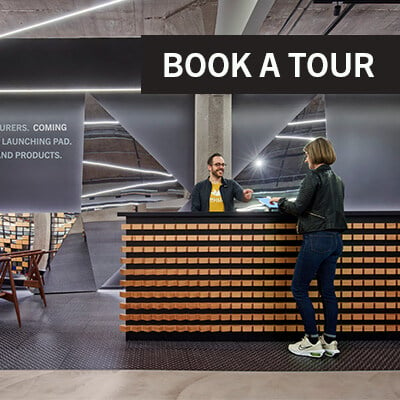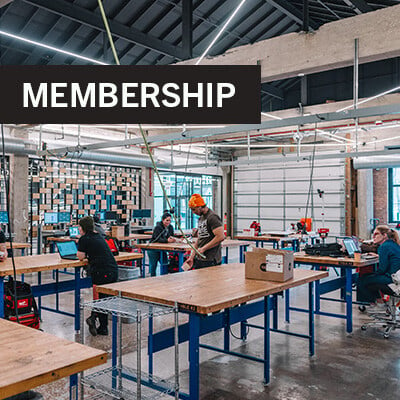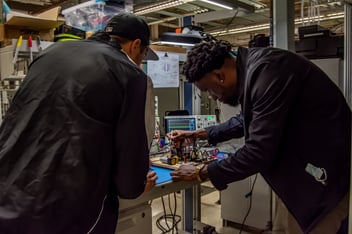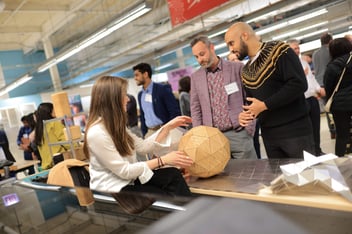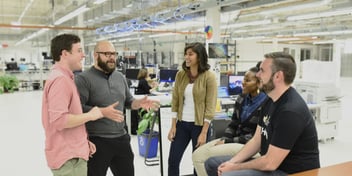Entrepreneurs developing physical products seek advice because they know building a successful startup involves navigating complex challenges.
Getting guidance from experienced startup founders can provide valuable insights, strategies, and perspectives that can help a founder along their journey. Below are some tips and insights from founders who are members at mHUB, the leading innovation center supporting hardtech entrepreneurs.
1. Do research.
While it might seem obvious: do your research. Gain a deep understanding of your market, customers, and competition. Research helps identify opportunities, assess risks, and refine business strategies. Thorough research provides a foundation for creating a sustainable and competitive business model, helping entrepreneurs anticipate challenges and adapt to changing circumstances effectively. It will help you make informed decisions and determine whether or not you have a viable business worth pouring your blood, sweat, and tears into.
Here’s one example of an important question a founder should ask:
- Is there IP (intellectual property) already?
- Is that a barrier to what you might want to make?
When you do research, employ market sizing tools, and check for infringement possibilities early-on in the concepting and feasibility of your product, it can help you hone in on the unique solution you’re trying to solve and the specific niche audience that you’re trying to serve.
Read more in The most important product innovation considerations.
2. Ask Yourself: Is this manufacturable?
Innovators who are dreaming of the products they need in their life, or products they wish existed to serve a specific need they’ve observed, may start out not knowing if their product can actually be made. As product developers go through the design and iterative prototyping process, they might learn how the design of their product has to change in order for the product to get made.
This is called “design for manufacturing” (DFM). Design for manufacturing means you approach product development with an understanding of how you’re going to manufacture the final product.
The key here for making your product-based business financially viable is to aim to produce your product at a fifth of the cost you're selling to your customer. Which leads to the next tip…
3. Know your numbers.
Know your distribution models and what those markups are so you can put the data from your research into your financial model. As you build your financial model, you want to watch the calculations for profit margin.
If profit margin is projected to be lower than 15%, then profits will likely be too small to make this business worth your time. If you calculate an estimated profit margin ranging from 20-30%, then you can likely commercialize your hardtech and make that business work.
If the profit margin in your financial model is over 30%, that’s a scalable business - but you will likely have more competitors, which means you’ll need to have better IP and you’ll have to take more action to be more competitive.
4. Build a team with complementary skills
Entrepreneurs must admit that they have ‘blind spots’ – areas of expertise that they just don’t have. Startup founders benefit from hiring people with complementary skills because it enables them to move through the hardtech development process more quickly.
Diverse skill sets enable the team to tackle a broader range of product research, product design and testing, fostering innovation and problem-solving through each step of the hardtech development process. Team members with complementary skill sets ‘fill the gaps’, enhance overall productivity, and provide that competitive edge to become the leader in a market niche.
See more advice about how to hire for your startup.
5. Vet manufacturers
When you’re designing your product for manufacturability, you might start researching different manufacturers to work with. Read What an Early-Stage Startup Needs to Know About Contract Manufacturing. The key here is that you don't want to be a small part of their business (i.e. so small they don't care), but you also don’t want to be “all” of their business too. Aim to find a manufacturer that is willing to figure out if the relationship is the right fit. Look at their preferred volume – the minimum order quantity (MOQ) or minimum viable quantity that the contract manufacturer has determined makes the most sense for their business. If the volume of your production run matches their MOQ, you might have a potential fit.
6. Your value proposition is unique to who it's presented to.
When you’re doing outreach, it’s important to tailor your messaging. Different audiences have distinct needs, preferences, and pain points. By customizing your value proposition, you demonstrate a clear understanding of your audience and show how your product or business endeavor directly addresses their unique challenges or desires.
Tailoring your value proposition for a targeted audience is essential because it increases the relevance and appeal of your offering to a specific group of people. This personalization enhances engagement and increases the likelihood of a desired outcome.
7. Be Resilient.
Stick through it. There will be ups and downs in your startup founder journey. mHUB Co-Founder, Bill Fienup, shares his personal founder journey in Top 4 Pain Points Innovators Experience During the Development of a Product. In that blog post, he shares his ‘bumps in the road’ that he encountered, he talks about where founders often hit roadblocks, and shares some insights on how to avoid these common pitfalls.
Conclusion
Launching a physical product-based business is challenging. mHUB shares significant startup resources so you don’t have to feel isolated. Read Everything You Need to Know About the Technical Side of Launching a HardTech Startup and book a tour to learn about all the resources offered through the mHUB Innovation Center.
